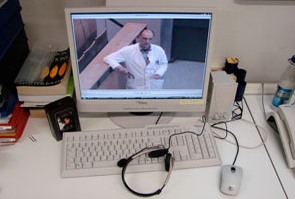Case-based Learning in Further Education
QUOMED – Continuing Medical Education Online
Acceptance of technology-based conceptual artefacts in knowledge communities: applications to EO Image Information Mining (2013-2015)
While addressing applications involving Information Mining in large data collection and EO images, it is of utmost importance to understand and model the behavior of users who interact with high complexity technologies and collaborate within interdisciplinary communities. In such cases, interdisciplinary collaboration is enabled by the joint use of conceptual artefacts (e.g., negotiable concept definitions), immaterial objects used in community practice to describe the environment and predict its evolution. Community members with different professional backgrounds and expertise levels may use conceptual artefacts generatively (while adding information to the artefact), or receptively (while searching, finding and using information that is included in the artefact). Previous psychological research suggests that community members’ use intentions and their actual artefact usage are influenced by their perceived role definition within the community. However, little is known about how to establish role definitions in communities, and about how to train them. Against this background, the proposed study will be contextualized in a EO Image Information Mining community of practice and will aim at (1) examining the influence of perceived role definitions on the individual use intention and actual usage of a specific conceptual artefact, and (2) conceiving, developing and evaluating a training scenario that increases community members’ artefact acceptance. The significance of the study for scientific practice comprises the improvement of interdisciplinary communication within researchers’ communities. At conceptual level, the study should contribute to a deeper understanding of knowledge reification and conceptual artefact acceptance in communities of practice.
Funding agency:
- DLR, DAAD
Cooperation partners:
- Prof. Dr. Mihai Datcu, German Aerospace Center, Remote Sensing Data Center (DLR-DFD), Oberpfaffenhofen
Project team:
COMPARE – Competent Argumentation with Evidences. Measurement and Modeling in Educational Sciences and Transfer from Medical Studies
This project seeks to analyze the competence of evidence-based argumentation in disciplines like educational sciences and medicine. In the process, two studies will focus on investigating the development of this competency. The goal of the longitudinal and cross-sectional study is to develop a model of this competence based on stages. In a third study with a semi-experimental design, the composition of the competency with regard to various dimensions of knowledge and competencies will be analyzed. A long-term goal is to develop and test instruments to measure evidence-based argumentation skills, which can be used in the continuing education of teachers and other educators.
Several of the concrete questions that will frame the research are:
1) Which steps and dimensions of the skill of evidence-based argumentation can be empirically identified and differentiated?
2) To what extent are existing models in medical education transferable to other educational domains?
3) To what extent can the development of this skill be determined in the course of a student’s education?
4) If cognitive prerequisites exist for the development of the skill of evidence-based argumentation, what are they and how do they relate to the skill?
The project is funded by the Federal Ministry of Education and Research and will be carried out in cooperation with the Bergischen Universität Wuppertal and the clinic of the LMU Munich, Department of Pedagogy and Continuing Studies.
Possibilities for Conducting Further Studies Within the Framework of the Study:
For additional information about the project, details about the research questions or inquiries about the possibility of writing Bachelor, Master or Admittance theses within the framework of the project, please contact Andreas Hetmanek anytime.
Cooperation Partners:
- Prof. Cornelia Gräsel (Project Director, Bergische Universität Wuppertal)
- Prof. Martin Fischer (Department of Pedagogy and Continuing Studies, Clinic of the LMU Munich)
- Jan Kiesewetter, Dipl.-Psych. (Department of Pedagogy and Continuing Studies, Clinic of the LMU Munich)
Project Participants in the Department:
Funders:
Federal Ministry of Education and Research (BMBF); Funding focus: “Modeling and Measuring Competencies in Higher Education”; Feb 2012 until Jan 2015top
QUOMED – Continuing Medical Education Online
The aim of this project is to design academic case-related online seminars based on existing series of continuing medical education on general and internal medicine of the LMU Munich and the Charité Berlin. Especially, physicians from other institutions should get the possibility of taking part in these seminars and to exchange experiences with colleagues and experts. The key element of the didactic concept is case-based learning supported by collaboration scripts. Additionally the development of an online community for practising physicians in general and inner medicine is planned. This community has the potential to bring the physicians a novel alternative for mutual consultation.
Research questions of this project are: What are the effects of collaboration scripts on case based learning and how can the development of a community for this special interest group of resident physicians be promoted?
This cooperative project between the Chair of Medical Didactics (coordination) of the LMU, the Kompetenzbereich eLearning der Charité Berlin, the Medical Association in Berlin, INSTRUKT enterprise and the Chair of Education and Educational Psychology of the LMU is funded by Klaus Tschira Foundation.

Links to cooperation partners
- Klaus Tschira Stiftung
- Medizindidaktik LMU
- Kompetenzbereich eLearning der Charité Berlin
- Ärztekammer Berlin
- INSTRUKT

